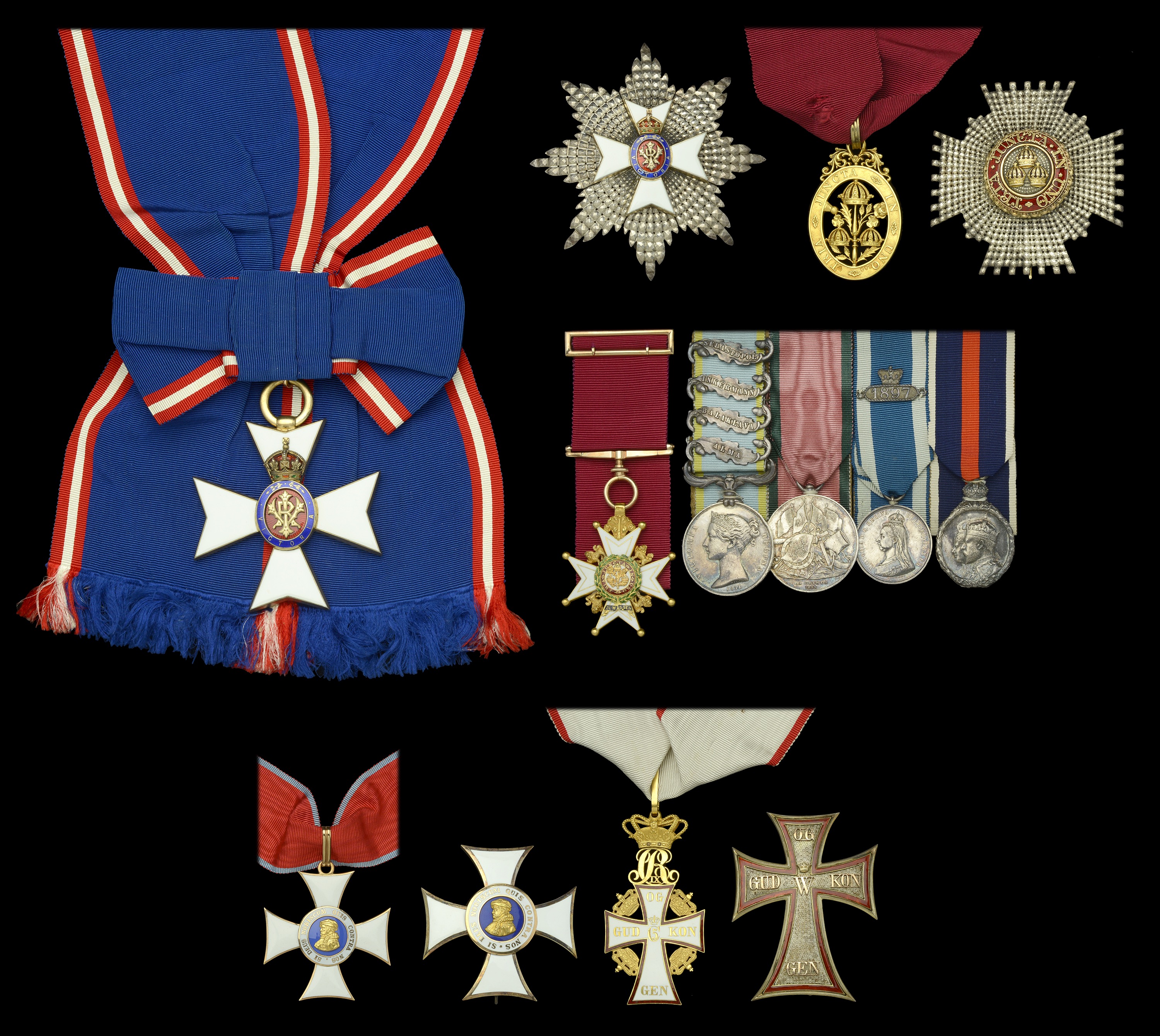A fine ‘Royal Household’ G.C.V.O., ‘Civil Division’ K.C.B., Crimean War C.B. group of nine awarded to Colonel Sir Robert N. F. Kingscote, Scots Fusilier Guards, later Honorary Colonel, 4th Battalion, Gloucestershire Regiment, who served as a Member of Parliament for Gloucestershire, Receiver-General to the Duchy of Cornwall, and Paymaster to the Royal Household and Extra Equerry to H.M. King Edward VII The Royal Victorian Order, G.C.V.O., Knight Grand Cross, set of insignia, comprising sash badge, silver-gilt and enamel, reverse officially numbered ‘34’; and breast Star, silver, silver-gilt, and enamel, reverse officially numbered ‘34’, with gold retaining pin, with full sash riband; The Most Honourable Order of the Bath, K.C.B. (Civil) Knight Commander’s, set of insignia, by Garrard, London, comprising neck badge, gold, 18ct, with maker’s mark and hallmarks for London 1877, with later ring suspension; and breast Star, silver, gold and enamel, unmarked, with gold retaining pin; The Most Honourable Order of the Bath, C.B. (Military) Companion’s breast badge, gold and enamel, being a refurbished badge from 1815, with gold split ring and narrow bar suspension, with integral gold two-pronged riband buckle; Crimea 1854-56, 4 clasps, Alma, Balaklava, Inkermann, Sebastopol (Lt. Col. R. N. F. Kingscote. Scots Fu Gds.) hunt & Roskell engraved naming; Turkish Crimea 1855, Sardinian issue, a contemporary tailor’s copy by ‘J.B.’, unnamed ; Jubilee 1887, clasp, 1897, silver, unnamed as issued; Coronation 1902, silver, unnamed as issued; Germany, Hesse-Darmstadt, Order of Philip, 2nd type, Second Class set of insignia, comprising neck badge, 49mm x 49mm, gold and enamel, unmarked; breast Cross, 59mm x 59mm, silver, silver-gilt, gold appliqué, and enamel, unmarked; Denmark, Kingdom, Order of the Dannebrog, C.IX.R. (1863-1906), Second Class set of insignia, comprising neck badge, 83mm x 39mm, gold and enamel, with gold mark on suspension loop; breast Cross, 71mm x 56mm, silver, silver-gilt, gold appliqué, and enamel, unmarked, with twin retaining pin, edge bruising and contact marks to the Crimea Medal, otherwise generally extremely fine (13) £7,000-£9,000 --- Provenance: Spink, May 2001. G.C.V.O. London Gazette 9 November 1902. K.C.B. (Civil) London Gazette 5 July 1889. C.B. (Military) London Gazette 31 July 1855. Sir Robert Nigel FitzHardinge Kingscote was born on 28 February 1830, the eldest son of Colonel T. H. Kingscote, a descendant of the 6th Duke of Beaufort. Commissioned a Lieutenant by purchase in the Scots Fusilier Guards on 27 October 1846, he was promoted Captain by purchase on 28 June 1850 and to Major in December 1854. He served throughout the Crimean War, was one-time Aide de Camp to Lord Raglan, and was present at Battles of Alma, Balaklava and Inkermann, in addition to the operations before Sebastopol. For his services in the Crimea he was created a Companion of the Order of the Bath. Promoted Lieutenant-Colonel on 17 July 1855, Kingscote transferred to the Retired List and was subsequently appointment as Groom-in-Waiting to H.M. Queen Victoria, in which capacity he served until 1866. Additionally an M.P. for Gloucestershire from 1852 to 1885, and sometime Honorary Colonel of the 4th Battalion, Gloucestershire Regiment, he accepted in the latter year the post of Commissioner of Woods and Forests and, in 1888, the position of Receiver-General to the Duchy of Cornwall. Created a Knight Commander of the Order of the Bath for his work in these offices in 1889, Kingscote went on to become Paymaster to the Royal Household and an Extra Equerry to H.M. King Edward VIl in 1901, for which services he was appointed a Knight Grand Cross of the Royal Victorian Order in November the following year. He died on 22 September 1908.





